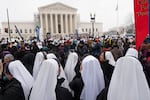
Demonstrators participate in the March For Life anti abortion rally in front of the US Supreme Court in Washington, DC on January 19, 2024.
Roberto Schmidt
The Catholic Church has long been one of the most powerful opponents of abortion in the United States. In fact, it’s one of the largest private entities bankrolling campaigns against abortion rights.
But Catholic bishops are taking a very different approach this year, according to an analysis by NPR and Religion News Service. As voters in 10 states consider abortion-related ballot questions, Catholic bishops have spent millions less on donations to anti-abortion campaigns than in previous years, according to public financial documents.
This year, across all 10 states with abortion rights ballot measures, bishops have donated just over $1 million, according to financial disclosures published by secretaries of state. That’s less than a third of the nearly $3.7 million a single Kansas diocese donated two years ago. In Ohio in 2023, Catholic bishops contributed $1.7 million to a political action committee set up to fight an abortion rights ballot measure.
Bishops in just three states have made donations this year: roughly $30,000 in Missouri; $50,000 in Colorado; and about $900,000 in Florida.
In seven states — including Arizona, Montana and South Dakota — NPR and Religion News Service could not find evidence in public records that Catholic bishops have contributed anything to committees opposing abortion rights ballot initiatives.
NPR and Religion News Service reached out to bishops and Catholic conferences in all 10 states. Bishops in Arizona and South Dakota did not respond to requests for comment, while the executive director of the Montana Catholic Conference declined to be interviewed.
“We have not seen sort of those big money sums coming in yet,” said Jamie Morris, executive director of the Missouri Catholic Conference.
Overall, the campaigns to oppose abortion rights are drawing tens of millions less than the campaigns to enshrine those rights in state constitutions.
The Arizona for Abortion Access campaign has raised over $32 million, compared to the nearly $1.3 million raised by the opposition It Goes Too Far committee. In Florida, the spread is wider: over $90 million collected by the abortion rights side, compared to more than $9 million raised by two opposition groups.
The dramatic disparity seems to underline a new political reality after the Supreme Court overturned Roe v. Wade in 2022: Abortion rights have won in each of the six states that have seen ballot measures since 2022.
Those losses for Catholic bishops and anti-abortion activists could be creating a “demoralizing effect,” Morris said.
Bishops and Catholics shift their anti-abortion messaging
In an election season where a majority of Americans say they support abortion rights, the bishops aren’t primarily campaigning on their fundamental opposition to all abortions.
Instead, they’re arguing these amendments — such as Florida’s Amendment 4, which would enshrine abortion rights into the state’s constitution and end its 6-week ban on abortions — would allow greater abortion access than most voters would want, including those who identify as “pro-choice.”
Arizona’s bishops are arguing the same point. So are bishops in Missouri, Montana and Colorado, where state laws already protect abortion access. Colorado’s proposed amendment would establish a right to abortion, without any limits, and allow state funding for abortion access through insurance coverage.
“It is far too extreme,” said Brittany Vessely, the executive director of the Colorado Catholic Conference. “The average Colorado voter would not like this. So the question of Colorado is, is this the opportunity to draw a line in the sand?”
Vessely and Catholic leaders are arguing the amendments are written with vague language that obscures their potential risks to women’s health by limiting the abortion regulations states could pass. That messaging is also intended for Catholics, 60% of whom say they disagree with Catholic bishops and instead support abortion rights.
“They’re starting to acknowledge that there is a disconnect between what people in the pews believe and what the hierarchy preaches from the pulpit,” Ashley Wilson, spokesperson for the group Catholic for Choice, said of the Catholic bishops.
This story was produced through a collaboration between NPR and Religion News Service.